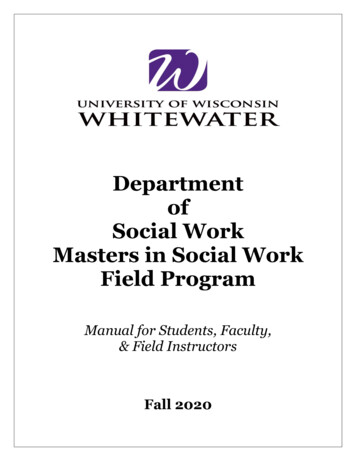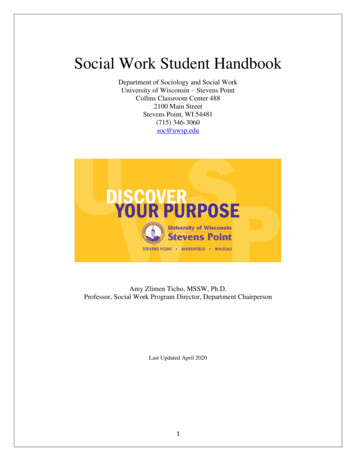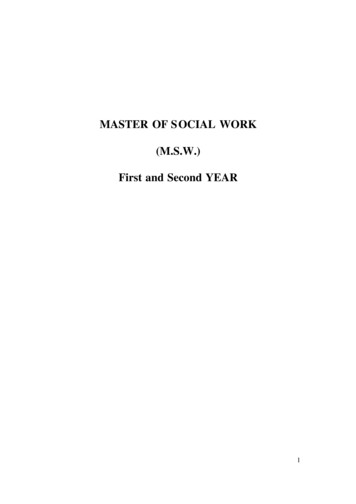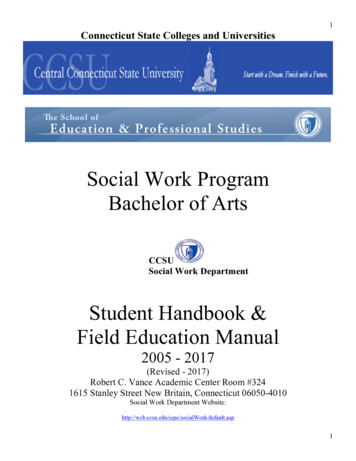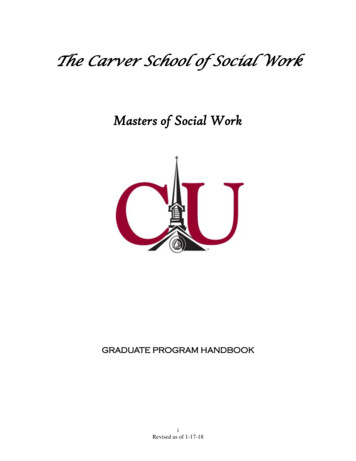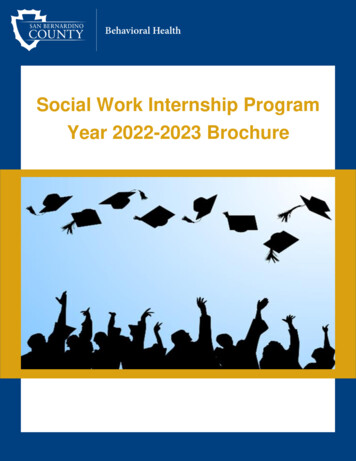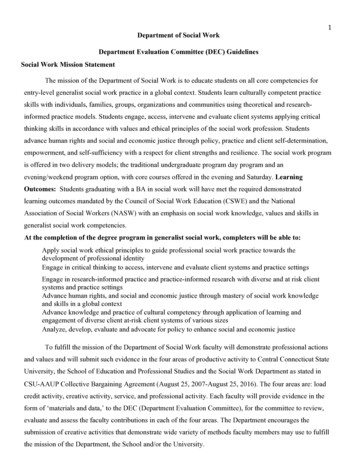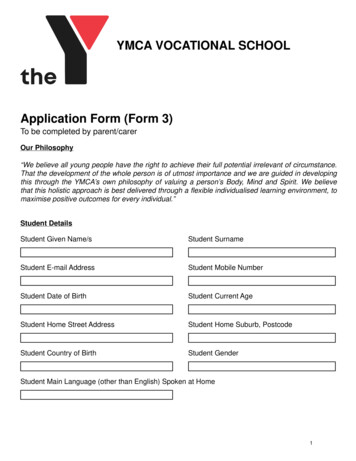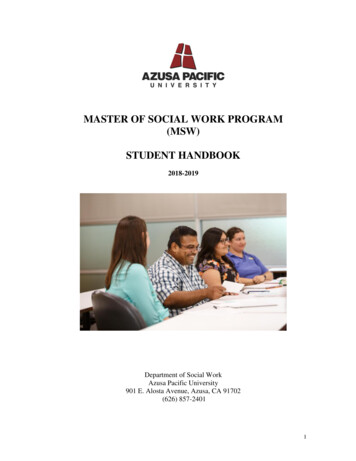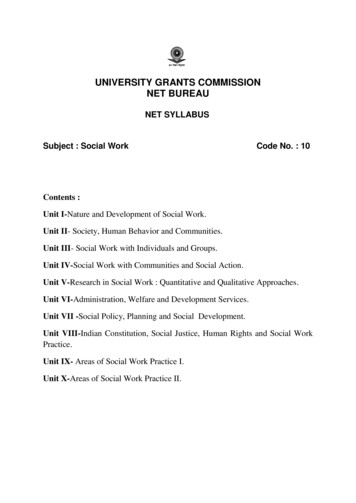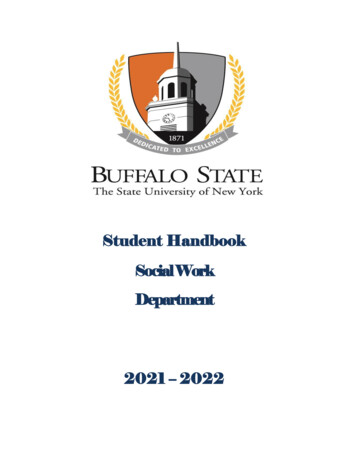
Transcription
Student HandbookSocial WorkDepartment2021 – 2022
Welcome to Social Work!The Social Work Department Handbook, together with the Social WorkDepartment Field Handbook, and the social work website, is intended toprovide you with a comprehensive guide for achieving your undergraduatedegree in social work.It is vital for Bachelor of Social Work students to be aware of and understandthe policies and procedures of the Social Work department at SUNY BuffaloState.Students are encouraged to contact their assigned faculty advisor should theyhave any questions. Most importantly if you have questions please ask.We wish you the very best and that your time with us is a life alteringexperience.Dr. Catherine M. Mazzotta, MSW, LCSW-RChair, Associate ProfessorSUNY Buffalo StateSocial Work Department1300 Elmwood Avenue354 - D CaudellBuffalo, NY 14222(716) 878-5705 (main office)mazzotcm@buffalostate.eduDepartment Website: www.socialwork.buffalostate.edu2 Page
Table of ContentsPREFACE .pp5SUNY BUFFALO STATE COLLEGE DEPARTMENT OF SOCIAL WORKHISTORY .pp6MISSION & GOALS . pp7GENERALIST SOCIAL WORK PRACTICE .pp7EDUCATIONAL STANDARDS AND VALUES .pp8THE SOCIAL WORK DEPARTMENT FACULTY AND STAFFpp9-14SOCIAL WORK MAJORADMISSIONS POLICY pp14DEGREE REQUIREMENTS .pp15SOCIAL WORK CURRICULUM .pp15PROGRAM REQUIREMENTS .pp16“ROAR-IN-FOUR” AT SUNY BUFFALO STATE pp16-17“ROAR-IN-FOUR” PLAN .pp17-18PART-TIME STUDENT ROAD MAP .pp18-19SOCIAL WORK COURSE DESCRIPTIONS pp20-22ELECTIVE COURSES IN SOCIAL WORK .pp22-24CAST CERTIFICATE (Child Advocacy Studies Certificate) .pp24FIELD PRACTICUMELIGIBILITY .pp25PURPOSE . pp25PRE-FIELD PRACTICUMM PROCESS pp26-30EMPLOYMENT-BASED FIELD PRACTICUM pp30 - 31SUMMER-START FIELD PRACTICUM pp31 - 32ADVISEMENT, SUPPORT, GUIDANCE, AND EXPECTATIONSADVISEMENT POLICY and ADVISORS .pp32-34CAREER COUNSELING AND GRADUATE SCHOOL .p34STUDENT GOVERNANCE .pp35 - 39DEPARTMENT STANDARDS AND EXPECTATIONSCOMMUNICATION WITH FACULTY p40WORDS OF WISDOM FOR SUCCESS .p40-41CELL PHONE AND TECHNOLOGY USE .p41ADDITIONAL EXPECTATIONS FOR BEHAVIOR .p41PROCEDURES REGARDING DISRUPTIVE INDIVIDUALS pp41-42NOTICE REGARDING THE STUDENTS OF CONCERN CARE TEAM p423 Page
ATTENDANCE, LATENESS AND CLASS PARTICIPATION .pp42-43ASSIGNMENT EXPECTATIONS .p43COURSE PROJECTS .p43SUMBITTING ASSIGNMENTS/PROJECTS,,,,, .p43 - 44TASKSTREAM .p44TURN-IT-IN p44ACADEMIC HONESTY pp44-45WRITING EXPECTATIONS p45ACCOMMODATIONS .p46ACADEMIC ASSISTANCE .p46PROCEDURES ON RETENTION AND TERMINATION OF STUDENTS .p46STUDENT PERFORMANCE REVIEW .pp46 - 47PROFESSIONAL ACADEMIC PERFORMANCE STANDARDS .pp47-53PROFESSIONAL ACADEMIC PERFORMANCE STANDARDS COMMITTEE .pp53-58PROCEDURES FOR READMISSION TO THE PROGRAM .p58ADDITIONAL SUPPORTS p59ORGANIZATIONAL CHARTS AND LINES OF COMMUNICATIONCOLLEGE ADMINISTRATIVE STRUCTURE p60SOCIAL WORK DEPARTMENT ORGANIZATIONAL CHART .p61LINES OF COMMUNICATION IN THE DEPARTMENT .pp62-64ADDITIONAL INFORMATIONSUNY BUFFALO STATE POLICIES .p65NON-DISCRIMINATION POLICY .p65SEXUAL HARRASSMENT POLICY .p65STUDENT COMPLAINS, GRIEVANCES AND APPEALS p65OTHER SUNY BUFFALO STATE POLICIES .p65QUICK QUIDESADVISEMENT GUIDE .p66DECLARING PRE-MAJOR, MAJOR, OR MINOR GUIDE p67TUTORING, WRITING, AND GENERAL SUPPORT GUIDE pp68-69REFERENCES .p70STUDENT HANDBOOK ACKNOWLEDGEMENT FORMp714 Page
PREFACEHOW TO USE THE STUDENT HANDBOOKThe purpose of this manual is to familiarize the student with the responsibilities,expectations, and procedures involved with the Social Work Program at SUNY BuffaloState.This manual provides: a statement of the purpose of the social work major. the responsibilities of all parties involved in education and practicum experience. the policies and procedures which regulate the social work department, such asthe National Association of Social Workers’ (NASW) Code of Ethics and theCouncil on Social Work Education (CSWE). Expectations of the social work program. ways students may become involved in department development, activities, andon the SUNY Buffalo State campus. Listing of support services for students: Support Academic Success SUNYBuffalo State CollegeThis manual outlines the social work curriculum, the core professional values andstandards that define the Social Work Program, and other professional practice issues.The Social Work Program at SUNY Buffalo State is committed to preparing students forgeneralist social work practice at the micro, mezzo, and macro levels, recognizing andappreciating diversity, and empowering students to advocate for social justice.This manual contains a general section and an appendix. The general section of themanual covers all aspects of the social work program at SUNY Buffalo State. Theappendix contains all pertinent reference materials.As a member of the social work program, you are expected to know theinformation contained in this handbook.5 Page
SUNY BUFFALO STATE COLLEGE DEPARTMENT OF SOCIAL WORKHISTORY OF THE SOCIAL WORK DEPARTMENTThe Social Work Department is one of the larger programs on campus. Annual studentenrollment averages 200. Each year approximately 90 students work in internshipsacross western New York. The Social Work Program is accredited through the Councilon Social Work Education (CSWE). The program was initially accreditation in 1975, andsubsequently reaffirmed in 1980, 1987, 1996, 2002, 2010, and most recently 2021.under the CSWE 2015 EPAS Standards.When the program originated, it was housed within the Department of HumanDevelopment, Family, and Community Relations. In 1977, The college reorganized, andthe social work program fell under the jurisdiction of the Department of Criminal Justiceand Social Work. In 1986, social work became an autonomous department in theFaculty of Applied Science and Education. In 2005, it moved to the School of theProfessions.The School of the ProfessionsThe School of the Professions (SOP) is a diverse community that expects its membersto think creatively and critically, act responsibly, and lead effectively. Building on thesedefining qualities, the SOP transforms students through academic excellence andexperiential learning. The School of the Professions is a leader in preparing twenty-firstcentury professionals to excel in a changing world and is recognized regionally,nationally, and internationally for its innovative curricula, pedagogy, and leadershipdevelopment. The SOP abilityEthical PracticeFostering commitment to stewardship for local and globalconcerns.Promoting and supporting rigorous expectations for learning,teaching, and scholarship.Embracing differences in people and perspectives crucial todiscovery and ingenuity.Advancing creativity to solve complex problems and seize newopportunities.Planning and managing our resources in a finite world.Modeling high professional standards and exemplary mission (Retrieved July 1, 2018)MISSION OF THE SOCIAL WORK DEPARTMENT6 Page
The SUNY Buffalo State Social Work Department prepares Bachelor-level generalistsocial workers, grounded in the liberal arts, who are guided by a person-in-environmentframework and scientific inquiry to act ethically; think critically; respect diversity anddifference; advocate for human rights, social and economic justice, and for theelimination of poverty; and promote human and community well-being locally andglobally while working with diverse individuals, families, groups, organizations, andcommunities.GOALS OF THE SOCIAL WORK DEPARTMENT1.To educate students in the knowledge, values, critical thinking, affect, andcompetency skills necessary for entry-level social work practice withindividuals, families, groups, organizations, and communities in diversesettings.2.To educate students in ethical generalist social work practice with a focus onvaluing diversity and difference, social and economic justice, and advocatingwith and on behalf of individuals, families, groups, organizations, andcommunities in diverse settings.3.To engage in improving the quality of life in the city of Buffalo and the largercommunity by means of experiential opportunities in diverse settingsthroughout the curriculum such as service learning, field practice, communityevents, and international projects.GENERALIST SOCIAL WORK PRACTICEGeneralist social work practice is grounded in the liberal arts and the person-inenvironment framework. To promote human and social well-being, generalist socialwork practitioners use a range of prevention and intervention methods in their practicewith diverse individuals, families, groups, organizations, and communities based onscientific inquiry and best practices. The generalist practitioner identifies with the socialwork profession and applies ethical principles and critical thinking in practice at themicro, mezzo, and macro levels. Generalist practitioners respect and engage diversityin their practice and advocate for human rights and social and economic justice. Theyrecognize, support, and build on the strengths and resiliency of all human beings. Theyengage in research-informed practice and are proactive in responding to the impact ofcontext on professional practice.Educational Policy 2.0—Generalist Practice, Council on Social Work Education7 Page
EDUCATIONAL STANDARDS AND VALUESThe SUNY Buffalo State Social Work Program sets educational standards and valuesaccording to the Council on Social Work Education’s accreditation standards.Adherence to these standards and values is expected of all students in the Social WorkProgram and will be evaluated on an ongoing basis as part of their overall standing inthe program.Our graduates will demonstrate the ability to:1. Demonstrate ethical and professional behavior in the classroom, on the BuffaloState campus, at their field placements, and within the community at large.2. Engage diversity and difference in practice.3. Advance human rights and social work economic justice.4. Engage in practice informed research and research informed practice.5. Engage in policy practice.6. Engage with individuals, families, groups, organizations, and communities.7. Assess individuals, families, groups, organizations and communities.8. Intervene with individuals, families, groups, organizations, and communities.9. Evaluation with individuals, families, groups, organizations, and communities.(Council on Social Work Education, editation-Process/2015EPAS/2015EPAS Web FINAL.pdf.aspx8 Page
SOCIAL WORK DEPARTMENT FACULTY AND STAFFDEPARTMENT CHAIRCatherine Mazzotta, Ph.D., MSW, LCSW-R (2014, SUNY at Buffalo)Associate ProfessorCaudell 354-D(716) 878-5705mazzotcm@buffalostate.eduDr. Catherine Mazzotta began teaching in the Department of Social Work at SUNYBuffalo State College in Buffalo, NY in 2015. She a licensed clinical social worker withover 25 years of clinical experience working in mental health, substance abuse andtrauma. In addition to her clinical practice, she has served as an executive director ofan anti-domestic violence agency and as clinic director of a community-based clinic thatserved clients compromised by long term behavioral health issues. Dr. Mazzotta is wellversed in organization management, development, regulatory oversite, and agencyoperations. Dr. Mazzotta has provided leadership on the local and state-wide level topromote legislative and policy initiatives to address the needs of individuals and childrenimpacted by domestic violence. Dr. Mazzotta has served the chair of the RochesterMonroe County Domestic Violence Consortium and as President of the Board ofDirectors of the New York Coalition Against Domestic Violence. She has served asclinical faculty, University of Rochester, School of Medicine and Dentistry, Departmentof Psychiatry, Rochester, NY, and adjunct faculty, Karl Menninger School of Psychiatryand Mental Health Sciences, Marital and Family Therapy Training Program, Topeka,KS. Dr. Mazzotta is affiliated with the Laboratory of Interpersonal Violence andVictimization, Department of Psychiatry, University of Rochester.Dr. Mazzotta has dedicated her career, as a clinician, teacher, community organizer,advocate and researcher, to intervention and prevention efforts for victims of intimatepartner violence. She approaches her work from a feminist and social justiceperspective.FIELD DIRECTORKaren E. Edmond, MSW, LMSW (2000, SUNY at Buffalo)Caudell 356(716) 878-5127edmondke@buffalostate.eduProfessor Karen E. Edmond has over 18 years of experience in Social Work Education.Currently, she is the Director of Field Education for SUNY Buffalo State Social WorkDepartment where she has provided six years of service to the department. She utilizesher role to support and develop social work internship programs in Western New Yorkagencies who would not normally host social work interns. Ms. Edmond also works atthe University at Buffalo, School of Social Work as a permeant part time faculty member9 Page
teaching Diversity and Social Justice for the summer MSW Program. As a clinician, Ms.Edmond has 20 years of experience working with various client populations such aschildren and families with a specific focus on infant/toddler mental health/wellness. Shecontinues to maintain her relationship to agencies through her community service andactivities.FULL-TIME, TENURED FACULTYJessica Fitzpatrick, Ph. D, J.D., MSW, LMSW (2015, SUNY at Buffalo)Associate ProfessorCaudell 359(716) 878-5324fitzpajm@buffalostate.eduDr. Fitzpatrick has been teaching full-time in the SUNY Buffalo State Department ofSocial Work since Fall 2017. She received tenure and promotion in 2021. Prior to this,she was an Assistant Professor of Social Work for two years at SUNY Fredonia and anAdjunct Professor of Sociology at SUNY at Buffalo and SUNY Buffalo State College forfive years. Her research focuses on teen dating violence, and she has recentlypublished a book chapter on the topic, "Breaking up is hard to do: Teen dating violencevictims’ responses to partner suicidal ideation." She has over 20 years of experience inthe field working in the areas of domestic violence, homelessness, addition, mentalhealth, reproductive health care, and traditional and holistic health.Kimberley M. Zittel-Barr, Ph.D., MSW (2003, SUNY at Buffalo)Associate ProfessorCAUD 349878-6101zittelkm@buffalostate.eduDr. Zittel-Barr has been teaching in the SUNY Buffalo State, Social Work Departmentfor fourteen years. She received tenure and promotion in 2012 and has been theDepartment Chair for five years. Prior to her appointment with the SUNY Buffalo StateSocial Work Department, Dr. Zittel-Barr was a Clinical Assistant Professor for threeyears, creating and instructing behavioral health courses at the University at Buffalo,School of Dental Medicine. She also served as an Adjunct Professor at the University atBuffalo, School of Social Work for five years, and a Field Supervisor and Liaison forseven years at the University at Buffalo School of Social Work. She is well-known forher research in access to care including perinatal mood and anxiety disorders and olderadults’ access to dental care in Western New York. Her article, “Desired assistanceversus care received for postpartum depression: Access to care differences by race,” ispromoted by the National Institutes of Health. Her book, “Postpartum mood disorders: Aguide for medical, mental health, and other support providers,” published by the NASWPress, is promoted by the Postpartum Support International. Dr. Zittel-Barr initiated theWestern New York Perinatal Mood and Anxiety Disorders Task Force through Project62, a subsidiary of the Postpartum Resource Center of New York. Additionally, she was10 P a g e
the invited keynote speaker for the 9th Annual Beyond the Baby Blues Conference inMinnesota, presented twice at the prestigious Marcé Society, in Australia, and is soughtafter by the local media for her expert opinions on the topic of perinatal mood andanxiety disorders. Clinically, Dr. Zittel-Barr has extensive experience working with sightimpaired older adults in residential settings and behavioral health issues in nonresidential settings.FULL-TIME, TENURE-TRACK FACULTYJames C. Golden, Ph.D., MSW (2002, SUNY at Albany)Assistant ProfessorCaudell 347(716) 878-4665goldenjc@buffalostate.eduDr. Golden began teaching in the SUNY Buffalo State Social Work Department inSeptember 2019. Prior to his appointment with the SUNY Buffalo State Social WorkDepartment, he was an Assistant Professor in the Social Work Department at DaemenCollege from 2017-2019, and prior to that, served as the Chair of the Social SciencesDivision at Hilbert College, where he had earned the rank of Professor. Dr. Golden’sclinical experience is in the field of substance abuse, and specifically substance-abusingperpetrators of domestic violence and/or violent sexual offenses.Amy Manning, PhD., MSW, LMSW (2011, SUNY at Buffalo)Assistant ProfessorCaudell 363(716) 878-4767manninar@buffalostate.eduDr. Manning is a licensed master social worker with over 10 years of experienceworking in mental health and school based social work.In addition, Dr. Manning has been in macro social work positions dedicated to severalareas of prevention. Dr. Manning has worked in research and evaluation, and in policyand procedure development, evaluation, training and technical assistance locally andinternationally. Her career is dedicated to prevention science, training helpingprofessionals to understand their role in good practice, school based social work, andchild and adolescent mental health.Berg Miller, PhD., MSW, LMSW (2020, SUNY at Buffalo)Assistant ProfessorCaudell 361(716) 878-5327millerbk@buffalostate.eduDr. Miller (she/they) began as an Assistant Professor in the Department of Social Workat SUNY Buffalo State College in Buffalo, NY in 2020. Prior to this, she taught as an11 P a g e
Instructor at SUNY at Buffalo, Edinboro University, and Harold Washington College ofthe City Colleges of Chicago. Dr. Miller’s research focuses on topics related tointersectionality and microaggression, and they recently published an article in SocialWork & Policy Studies: Social Justice, Practice and Theory for the special issue entitledBeyond “Cultural Competency”: Confronting Whiteness in Social Work. Dr. Miller is alicensed master social worker who was previously a Community Support Specialist inChicago, IL, for the largest mental health agency in the Midwest, where she providedcase management services for adults with mental illnesses and assisted in the provisionof training on social justice and LGBTQ issues.FULL-TIME, LECTURERMark Boser, LCSW-R (1985, SUNY at Buffalo)LecturerCaudell 351(716) 878-5709bosermt@buffalostate.eduMark Boser has been teaching in the SUNY Buffalo State, Social Work Department as afull-time lecturer since fall, 2016. Prior to this, he served as an adjunct professor in theDepartment, beginning fall-2014. As a licensed clinical social worker, Professor Boserworked with families and individuals for over 35 years. For 34 years, he worked at Child& Family Services, most recently as the Director of Family Preservation Services. In thisrole he focused on child abuse and neglect, to keep families together by preventingplacement of children out of their homes and expediting the return home when childrenwere placed. Professor Boser has extensive experience doing clinical work, providingindividual and family counseling and facilitating groups. He worked at Haven Houseassisting victims of domestic violence, and with children experiencing trauma at a localcommunity center. Professor Boser helped found Gay & Lesbian Youth Services ofWNY where he served as Executive Director for 17 years. He was active for severalyears in the NYS Chapter of NASW, serving on the LGBT Committee. He currentlyserves as Chair of the LGBT-Domestic Violence Committee of WNY. Prior to becominga full-time instructor in August 2016, he has been an adjunct faculty member at SUNYBuffalo State since the fall of 2014.Tonya Myles-Day, MSW, LMSW (2015, SUNY at Buffalo)LecturerCaudell 357(716) 878-5137mylesdtd@buffalostate.eduTonya Myles-Day has been teaching at SUNY Buffalo State, Social Work Departmentfor three years. In conjunction with this, she has recently accepted a position at theUniversity at Buffalo as a PLAN Coach/Interventionist; in the Jacobs School ofMedicine. As part of a research project assessing possible connections betweenbehaviors and childhood obesity, Ms. Myles-Day conducts the family sessions of a12 P a g e
family-based behavioral weight loss treatment (FBT) within primary care practices. Priorto accepting this position, she has worked with underrepresented youth in academicprograms such Buffalo-Area Engineering Awareness for Minorities as the ExecutiveDirector; creating educational opportunities for marginalized youth. She previouslyworked as an Individualized Care Coordinator at Child and Family Services, and aClinical Therapist at BestSelf Behavioral Health. She has a research interest in socialwelfare concerning juvenile delinquency and addressing the disparities of at-risk youtheffected by poverty. Additionally, she was the invited keynote speaker at the TheodoreRoosevelt Inaugural Site to discuss “A Century of Social Work: From Jane Addams toToday”.PART-TIME, LECTURERS – ADJUNCT FACULTYBeth Tripi, LCSW (2008, SUNY at Buffalo)LecturerCaudell 360(716) 878-3362tripiba@buffalostate.eduBeth Tripi, LCSW has been teaching in the SUNY Buffalo State, Social WorkDepartment as an adjunct professor for five years. In addition to this, she works fulltime in a child and adolescent behavioral health clinic as a senior clinician at CatholicCharities Monsignor Carr Children’s Institute in North Tonawanda, NY. In this role, sheis responsible for providing psychotherapy and social work services to children,adolescents, and their families, as well as assist with supervisory and administrativeduties for the clinic. Also, in her service at the behavioral health clinic, she has beentrained in the Progressive Counting method for trauma resolution in children andadolescents and has served on the Niagara County Children’s Single Point of Accesscommittee for seven years. Recently, this year, she began serving on the CommunityMissions, Inc Aurora House Children and Youth Community Residence intakecommittee. Ms. Tripi has extensive clinical experience working with young adults withmental illness, age 18-25, providing residential and case management services throughthe Young Adult Program with Transitional Services, Inc. and is a group facilitator forparents in the family court system at EPIC – Every Person Influences Children. She hasalso worked as a field supervisor in the past for BSW students from Buffalo StateCollege. She has been a member of the NASW national and NYS chapters since 2014.DEPARTMENT ADMINISTRATIVE ASSISTANTMargaret Brooks, BA (2013, University at Buffalo)Administrative Assistant 1Caudell 354(716) 878-5705brooksmr@buffalostate.edu13 P a g e
Ms. Brooks is the department’s administrative assistant. She previously worked atUBMD OB/GYN as a medical student coordinator, on campus in the Office ofAdmissions and for the Office of Mental Health. She earned her Bachelor of Artsdegree in Psychology from University at Buffalo, and A.S. inCommunications/Humanities from Corning Community College. She really enjoysshowing SUNY Buffalo State students who to connect with to get the correct answersfor their path of education.SOCIAL WORK MAJORADMISSIONS POLICYThere are three ways to gain admission to the social work major at SUNY Buffalo State:1. New transfer students applying to the college are subject to review by thedepartment chair for eligibility for admission to the department. Transfer studentapplications are reviewed by the Buffalo State Admissions. After acceptance to BuffaloState College transfer students who are coming in as a social work major, need toschedule an appointment with the Social Work Department Chair2. Currently attending SUNY Buffalo State students are accepted once they meet theeligibility requirements.3. Students seeking readmission to the program following a leave of absence from thecollege are subject to review by the department chair for eligibility to return to theprogram.Since social work is an upper division program only, first- and second-year students arenot generally eligible for admission directly to the major. They are assigned to pre-socialwork (SWKW) major. This stance offers the student the benefit of a social work facultyadviser for assistance in program planning in preparation for entry into the major.Admission to the major (SWK) requires the following: All prerequisites need tobe completed BEFORE a student can apply to the social work major.1. 45 credit hours completed at the time of application2. Minimum cumulative GPA of 2.5 at the time of application3. Completion of CWP 101 and 102 with a C or higher4. Completion of Human Biology 101 (BIO101) with a passing grade5. Significant progress toward completing the liberal arts degree requirements thatIncludes: ANY psychology course such as PSY101 AND ANY sociology coursesuch as SOC100.To declare the social work major, students view the online orientation to the major,which is posted on the department’s college website. After viewing the orientation,students need to schedule a time to meet with the Department Chair to answerquestions, sign the change of major paperwork, and to fill out an application form.Included on this form is a question about any physical, mental health, emotional or legal14 P a g e
issues that could affect ability to study or practice social work. This information isneeded for internship requirements. Failure to disclose information regarding suchdifficulties is a violation of the NASW Social Work Code of Ethics. Additionally, there isan obligation to report any changes to your legal history or status due to internshiprequirements. Please note, this information is requested in efforts to support studentsuccess and is not meant as punitive.DEGREE REQUIREMENTSTotal Required Credit Hours in Social Work: 51 creditsTotal Required College Credits Hours: 120 creditsTotal Required Field Practicum Hours: 420 hoursSOCIAL WORK CURRICULUMSocial Work is an upper-division curriculum requiring 45 credits for acceptance in themajor. Coursework for the social work major can be earned by full-time, day-only,evening-only and/or part-time attendance. Evening-only and/or weekend field placementis offered on a case-by-case basis, dependent on available agency options in thecommunity.The Social Work program starts in the fall semester every year. This means that allcourses are offered only once annually. If a course is missed, dropped, or failed,students must wait one academic year before the course is offered again.GRADE POINT AVERAGE (GPA) AND COURSE PERFORMANCE REQUIREMENTSTo maintain their status as a declared Social Work major, a student must:1. Pass every Social Work course taken; AND2. Obtain a minimum social work major GPA of 2.5 GPA for all courses taken in thefirst semester as a declared Social Work major, and maintain a minimum 2.5cumulative social work GPA thereafter; AND3. Maintain a minimum 2.5 cumulative GPA for all College/University coursestaken.If a student is not able to meet these academic requirements, the student will need towork with their social work advisor to develop an alternative academic plan that may ormay not include continuing in the social work major.15 P a g e
PROGRAM REQUIREMENTS:JUNIOR (1st) YEARSENIOR (2nd) YEARFALLSWK 220SWK 301SWK 307SWK 308SWK 422FALLSWK419SWK493SWK496SPRINGSWK 317SWK 320SWK � AT SUNY BUFFALO STATEBuffalo State guarantees that each student will have the opportunity to graduate with abachelor’s degree within four years. To provide this option, beginning with entering Fall2016 students, Buffalo State pledges to you that we will: Provide tools that allow you to monitor your degree programOffer general education and major requirement courses regularlyProvide you with an academic adviserAccept appropriate AP & IB scores and prior college credit obtained in highschoolPublish major and graduation requirements in the College CatalogNotify you of upcoming registration dates and timesIf you take the Roar in 4 Pledge, successfully follow all of the steps, and a majorrequired course is not available in your eighth semester, Buffalo State will provide anindependent study, course by contract, course substitution, or (through request to theProvost) a tuition waiver for that course.All first-time undergraduate students starting their first semester during the fall at BuffaloState are eligible for “Roar-in-Four”. There are a few exceptions, such as dual degreesand those who enter during a spring semester.Bachelor’s degrees consist of major and general education (Intellectual Founda
SUNY Buffalo State Social Work Department 1300 Elmwood Avenue 354 - D Caudell Buffalo, NY 14222 (716) 878-5705 (main office) mazzotcm@buffalostate.edu Department Website: www.socialwork.buffalostate.edu. 3 P a g e Table of Contents
